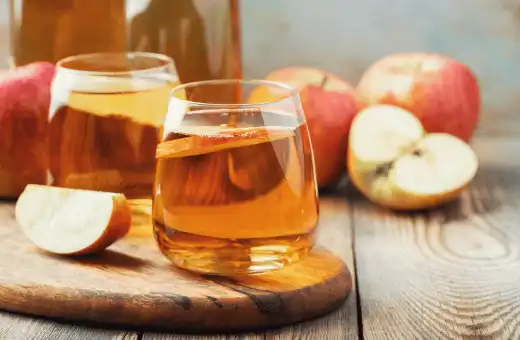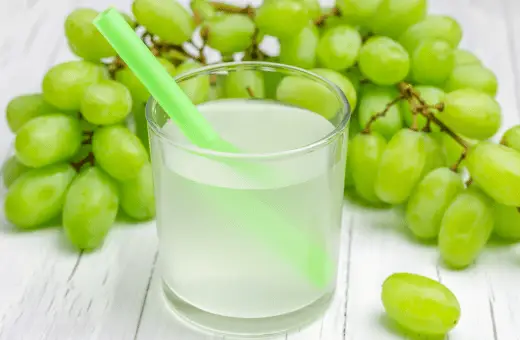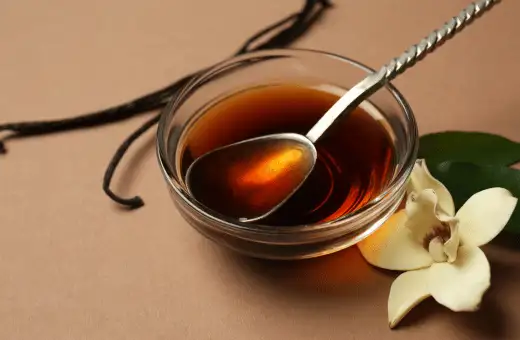Brandy is a popular ingredient in cooking, especially in savory dishes and desserts. It is often used to add depth and complexity to dishes like Coq au Vin and Beef Bourguignon.
But what happens when you run out of brandy or simply don’t have any on hand? Fear not, because there are plenty of substitutes for brandy that you can use in your cooking.
In this article, we’ll explore the 8 best substitutes for brandy and how to use them, along with the ratio that you should use in place of brandy.
In short, " What can I use instead of brandy?" Apple Juice or Apple Cider, Red Wine, Bourbon, Cognac, Sherry, White Grape Juice, Rum, Vanilla Extract.
What is brandy, and what does brandy taste like?
Brandy is an alcoholic beverage from distilled wine or other fermented fruit juice, usually grapes.
It is generally aged in oak barrels, resulting in a deep, rich flavor with notes of vanilla, oak, smoke and spices. Brandy typically has an ABV (alcohol by volume) of between 40-60%.
The taste of brandy can vary depending on the type of fruit it is made from and how long it has been aged.
However, most brands will have a strong alcohol taste as well as mellow notes of sweetness and woodiness from the oak barrels.
Generally speaking, brandy has a bold flavor with hints of sweet fruitiness that balances out its drier elements.
Uses of brandy
Brandy is a distilled spirit created from fermented fruit, usually grapes. It has a long history of being consumed and enjoyed around the world and can be used in a variety of ways.
One of the most popular uses for brandy is in cocktails. Brandy can add depth and complexity to drinks such as Sidecars, Manhattans, and even Corpse Revivers.
It creates a balance between the sweetness of other ingredients like an orange liqueur or sugar and the tartness of citrus juice or vermouth.
Brandy can also be served neat or on the rocks. It’s smooth texture and sweet flavor make it an ideal after-dinner drink, and its warm finish makes it great for chilled evenings with friends.
In addition to being enjoyed as a beverage, brandy can also be used for cooking.
Its sweetness adds complexity to dishes such as sauces, desserts, glazes and marinades – making even simple meals seem special.
Brandy can also be used to flambe foods such as crepes, Suzette, or bananas foster – adding both flavor and visual appeal to your dish!
Finally, brandy can also be used medicinally – either topically or internally taken as an elixir or hot toddy with lemon juice and honey to treat sore throats, colds, fevers, insomnia or digestive complaints.
The medicinal effects are thought to come from the alcohol content, which acts as an antiseptic and sedative while stimulating digestion and increasing circulation in the body.
Where to buy brandy?
If you are looking for where to buy brandy, there are a few different places you can go. Many specialty food stores carry it, as do some international grocery stores.
You can also order online from many retailers that provide a variety of diverse flavors and types of brandy.
Best substitutes for brandy with a ratio
1. Apple Juice or Apple Cider – a good substitute for brandy

Apple juice or apple cider is a superb substitute for brandy as it has a similar sweetness and fruitiness.
Ratio or measurement: When using apple juice/cider, use a 1:1 ratio - the same amount of apple juice/cider as the brandy required in the recipe.
If the recipe calls for a small amount of brandy, consider simmering the apple cider to intensify its flavor.
2. Red Wine – similar taste to brandy
Red wine, especially full-bodied ones like Cabernet Sauvignon or Merlot, can be used instead of brandy. It adds a deep and rich flavor to dishes like Beef Bourguignon or stews.
Ratio or measurement: When substituting, use a 1:1 ratio and reduce the wine by half before adding it to the recipe.
3. Try Bourbon in place of brandy

If you’re out of brandy and making a sweet recipe like pie filling or glaze for ham, Bourbon can be an excellent substitution.
It has a richness that complements dishes, and it gives off a distinct flavor profile.
Ratio or measurement: Use a 1:1 substitution ratio, as you would with apple juice.
4. Cognac – similar taste to brandy
Cognac is a comparable option for brandy since both come from wine and go through distillation.
They have similar flavor notes to add depth and complexity to meals.
Ratio or measurement: Cognac has a strong flavor, so start by using a mixture of half water and half cognac at the beginning of the recipe, and if necessary, adjust accordingly to get the needed taste and texture.
5. Sherry – a tasty alternative for brandy
Sherry is an excellent alternative to brandy, particularly in recipes with a sweet taste.
It has sour, nutty notes balanced with a little sweetness, making it an excellent choice for glazes, shortbread, and fruitcake.
Ratio or measurement: Use a 1:1 ratio substitution but read the recipe instructions beforehand.
6. White Grape Juice – similar taste to brandy

White Grape Juice is a fantastic non-alcoholic substitute for brandy in recipes that require brandy. It’s sweet and tangy and has a fruity taste, which is just what you need to uplift the dish.
Ratio or measurement: Use a 1:1 ratio.
7. Rum – A decent replacement for brandy
Rum is well suited for replacing brandy in desserts, especially when preparing fruit cakes, custards, and flans. However, the flavor will be different in the recipe.
Ratio or measurement: Use one teaspoon of rum for every tablespoon of brandy required in the recipe.
8. Vanilla Extract – similar taste to brandy

Vanilla extract is an excellent substitute for brandy in desserts such as cakes and cookies. It has a sweet and aromatic flavor that can bring out the best in your baked goods.
Ratio or measurement: The ratio of vanilla extract to brandy is one-to-one. Use the same amount of vanilla extract as you would with the brandy.
Tips on How to Choose the Most Suitable Substitution Option for Brandy
When selecting a suitable substitution option for brandy, consider the following tips:
1. Flavor Profile: Brandy has a distinctly fruity and wine-like flavor with hints of sweetness and warmth.
Look for alternatives that can offer a similar flavor profile. Options like cognac, fruit liqueurs, or fortified wines such as sherry or port can be suitable substitutes.
2. Alcohol Content: Brandy typically has a higher alcohol content. If the recipe requires the alcohol to be cooked off, consider using a substitute with a similar alcohol content to maintain the intended flavor.
If the alcohol content is not a concern, you can choose a non-alcoholic alternative like brandy extract or a combination of fruit juices.
3. Recipe Compatibility: Ensure that the substitute will complement the other ingredients and flavors in your recipe. Consider the overall flavor profile and how the substitute will interact with other components.
For example, cognac can be a suitable substitute in many recipes, particularly those that benefit from its grape-based character.
4. Cost and Availability: Consider the availability and cost of the substitute options. Brandy and cognac can be relatively expensive, so if budget is a concern, explore alternative options that provide a similar flavor profile within your budget.
5. Experiment and Taste: Conduct small tests by substituting the brandy with your chosen alternative in a small portion of the recipe. Taste and assess the impact on flavor and overall satisfaction.
Adjust the quantities or make any necessary modifications based on your taste preferences and the desired outcome.
6. Consider Other Liquors: Depending on the recipe, you can explore other liquor options that may work well as substitutes.
For instance, bourbon, rum, whiskey, or even fruit juices can provide unique flavors that enhance certain recipes.
7. Non-Alcoholic Options: If you prefer to avoid alcohol altogether, consider using non-alcoholic substitutes like brandy extracts or syrups that provide a similar flavor profile without the alcohol content.
Always refer to the specific recipe instructions and adapt the substitute based on your preferences and the desired outcome.
The goal is to find a suitable alternative that adds a similar flavor and depth to your dish while considering factors like alcohol content, recipe compatibility, and personal taste preferences.
Substitute for brandy in baking
In baking, brandy can be substituted with a number of other alcohols, such as rum, sherry, or cognac.
Since these substitutions are only partial replacements for the flavors and aromas that brandy brings to a dish, other ingredients like citrus zest, nutmeg, mace, or cinnamon can be added to the recipe to create an overall more flavorful result.
Additionally, some bakers may opt to use non-alcoholic liquids in their recipes in place of brandy.
Fruit juices like orange juice or apple cider are good alternatives that bring sweetness and depth of flavor without introducing any alcoholic content.
Another option is to use extracts such as vanilla extract or almond extract; while these don’t replicate the taste of brandy entirely, they do help enhance the flavor profile of many baked goods.
Substitute for brandy in sangria
When it comes to substituting for brandy in sangria, there are a variety of options available. For those looking to keep its wine-based foundation, one could use sherry or port instead.
These fortified wines come in a range of flavors and can easily be blended with the other ingredients in the sangria.
Additionally, one could also get creative and use rum or vodka as alternatives.
These distilled spirits will still provide the sweetness and complexity that brandy brings while adding their own unique flavors to the mix.
For an even more complex flavor profile, whiskey can be used as well, depending on how bold you’d like your sangria to be.
Ultimately, the best substitute for brandy is up to personal liking, so feel free to experiment with various liqueurs or spirits until you find the perfect combination for your sangria recipe!
Read More- non-alcoholic substitute for brandy.
Substitute for brandy in peppercorn sauce
A popular substitute for brandy in peppercorn sauce is dry white wine. This substitution will result in a more subtle flavor but still provide a nice depth to the sauce.
A good white wine to use would be something with higher acidity, such as Sauvignon Blanc, as it will add a bright note and balance out the richness of the sauce.
Additionally, some recipes suggest adding a tablespoon or two of lemon juice, which can help enhance the flavors and cut through any overly salty notes.
Finally, when adding white wine, reduce the amount used by about half compared to what you would typically use for brandy.
This will ensure that the flavors don’t become too muted or overpowered by any one ingredient.
Substitute for brandy in coq au vin
Substituting brandy in a coq au vin can be done with dry white wine, such as Chardonnay. When substituting with wine, the amount of liquid should be reduced to compensate for the alcohol content of the wine.
Using a dry white wine also helps to enhance the flavor and maintain the integrity of the dish.
In addition to substituting in a dry white wine, one could also opt for non-alcoholic options such as chicken or vegetable broth or even an apple cider vinegar and water mixture.
Whichever option is chosen, it is important to season the dish accordingly so flavors are not compromised.
Substitute for brandy in Christmas pudding
One of the most popular substitutes for brandy in Christmas pudding is rum. Rum is an alcoholic beverage that is distilled from sugarcane byproducts and flavored with various spices.
It can provide a richer, sweeter flavor than brandy while still adding depth and complexity to the pudding.
Another great alternative to brandy in Christmas pudding is sherry.
Sherry is a fortified wine created in Spain from white grapes, and its nutty, sweet flavor pairs perfectly with the traditional spices used in Christmas puddings like cinnamon, allspice, and nutmeg.
For a non-alcoholic option, try apple cider or apple juice instead of brandy.
The sweetness of the cider will lend a wonderful aroma to the pudding without the alcohol content of brandy or other liquors.
If you’re looking for an additional flavor boost, try mixing some grated orange zest into your holiday pudding as well – it adds a unique twist to the traditional flavors!
Substitute for brandy in pate
In place of brandy in pâté, you can use a variety of alcohols like white wine, port, cognac, or sherry. Using one of these will give your pâté more depth and complexity.
White wine is a great option if you want to keep the flavor light and fresh.
Port has a sweet and slightly fortified flavor that pairs well with savory ingredients, while cognac adds a warm and woody note.
Sherry is a versatile ingredient that can add nutty, fruity, or even floral flavors depending on what type you choose.
When substituting one of these for brandy, it’s important to adjust the amount used since they have different strengths in alcohol content.
Start with half as much as the recipe needs and adjust from there until you find the desired balance for your dish.
Substitute for brandy in fruit cake
A popular substitute for brandy in fruit cake is dark rum. It has a distinct flavor that lends added richness to the cake and allows keep it moist.
Dark rum is also a good substitute, as it can take the place of both alcohol and sugar in traditional recipes.
Additionally, it adds a subtle complexity to the flavors of fruits like raisins, currants, or citrus zest without overpowering them.
To enhance the flavor even more, try infusing your dark rum with spices like cinnamon or nutmeg.
Lastly, keep in mind that you may need to adjust other ingredients depending on how much liquid you are adding to replace the brandy.
Substitute for brandy in mulled wine
A great substitute for brandy in mulled wine is whiskey. Whiskey has a bold, smoky taste that can add warmth and depth to the drink while still offering its own unique flavor profile.
Additionally, whiskey often has higher alcohol content than brandy, so you may want to reduce the number of other liquors used if opting for this substitute.
When adding whiskey to your mulled wine, it’s best to use a variety such as Scotch or Bourbon, as they tend to have a more intense flavor than other types of whiskey.
Adding spices such as cinnamon and nutmeg can help balance out the strong alcohol notes and bring out rich flavors from the whiskey.
Substitute for brandy in French onion soup
In French onion soup, a good substitute for brandy is white wine. It adds a sharp, acidic flavor to the soup that complements the sweetness from the caramelized onions and adds depth of flavor.
Additionally, white wine pairs well with both beef and chicken bouillon, which are often used in French onion soup recipes.
White wine also has antioxidants that can help counteract some of the saltiness of the soup while still adding its own unique flavor profile.
When substituting for brandy in French onion soup, it is important to select a dry white wine like Pinot Gris or Sauvignon Blanc that will not overpower the other flavors in the soup.
For an even more subtle flavor profile, consider using dry sherry instead of white wine.
Substitute for brandy in stroganoff
If you don’t want to use brandy in your stroganoff, there are a few alternatives that can give the same delicious flavor.
White wine is a great substitute for brandy that will add a subtle sweetness and depth of flavor. You can also use sherry, cognac, or Madeira if desired.
For a non-alcoholic option, you can try using beef broth or vegetable stock combined with some Worcestershire sauce for additional flavor.
Whichever option you choose, make sure to adjust the salt levels accordingly, as these substitutes may have different levels of salinity than what is found in brandy.
Conclusion on substitute for brandy
All of these alternatives will work excellently in a variety of recipes when you run out of brandy. The key is to determine which substitution would work best for the recipe you have.
So, if you find yourself without a bottle of brandy, try one of these 8 substitutes to keep your meal delicious without compromising on taste.
Remember to use the substitution ratio prescribed in the article and keep track of taste regularly while cooking to avoid any issues. Happy Cooking!
FAQs on substitute for brandy
Q1. What is similar to brandy?
Other similar alcohols to brandy include cognac, Armagnac, pisco, Calvados (apple brandy), and grappa.
Brandy typically features a fruity flavor profile with notes of spices like nutmeg or cinnamon.
Other spirits that have similar profiles often include whiskey and rum.
Q2. Can cognac substitute for brandy?
Cognac and brandy are both types of distilled spirits, but they are not interchangeable.
Cognac is made from grapes, and brandy is typically made from other fruits, such as apples or peaches. Cognac has a distinct flavor that is smoother and more complex than that of brandy.
It also contains higher levels of alcohol by volume than brandy which generally ranges between 40%-45%.
The aging process for cognac involves double distillation in copper pot stills and aging in French oak barrels for an average of two to three years.
This aging process gives cognac a unique taste compared to other liquors like brandy, and some experts argue the longer the aging period, the better the drink.
Brandy is generally aged for several months in wooden barrels or stainless steel tanks which produces a lighter color and less intense flavor compared to cognac.
So although both types of liquor use distillation processes, the difference lies in the base ingredients used, their distinctive flavors, alcohol content, and particularly in the length of their respective aging processes.

